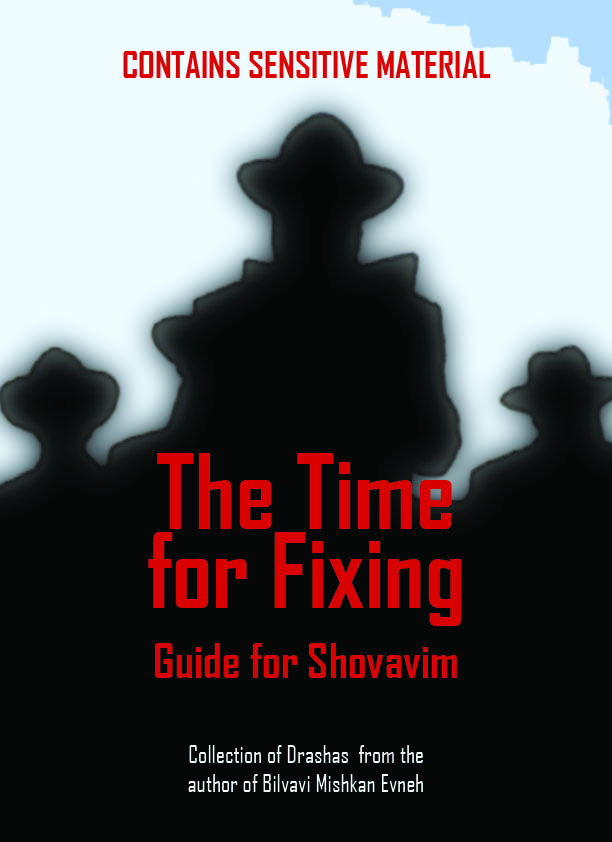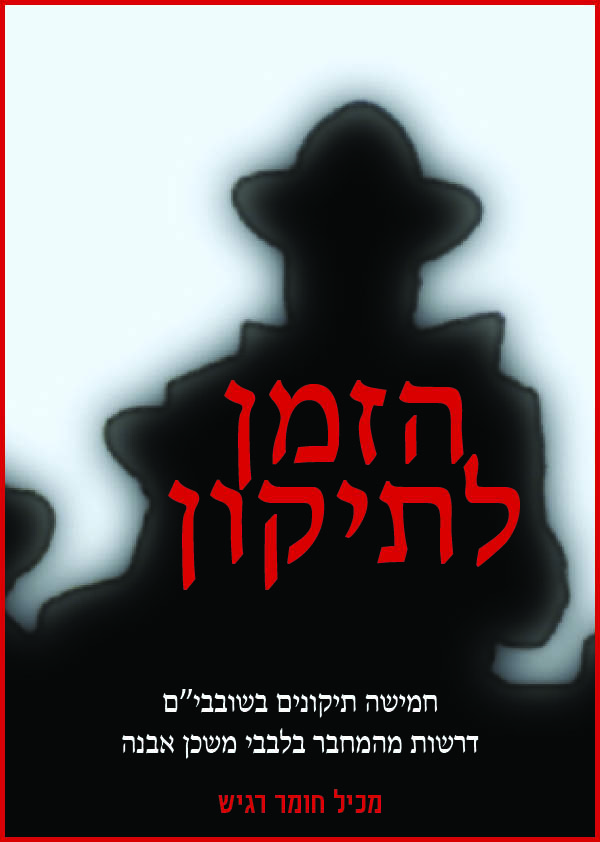- להאזנה תפילה 095 יגון ואנחה
095 Teshuvah Feeling The Inner Contradiction
- להאזנה תפילה 095 יגון ואנחה
Tefillah - 095 Teshuvah Feeling The Inner Contradiction
- 5670 reads
- Printer-friendly version
- שלח דף במייל
Asking Hashem To Remove The “Yagon”\Pain of This World
In the blessing of השיבה שופטינו we ask Hashem, והסר ממנו יגון ואנחה, “And remove us from worry and groan.” This is connected with the beginning of the prayer, where we ask Hashem to return to us our judges.
This is the second time in Shemoneh Esrei in which we ask Hashem to help us to do teshuvah. The first time was in the blessing ofהשיבנו. The concept of teshuvah, in essence, is about returning to our Source, to Hashem, and this is what we daven for in the blessing ofהשיבנו.
In this blessing, השיבה שופטינו, we are asking Hashem that our judges be returned – in other words, we are asking that the world should become returned to the ways of the Torah, which is the source that Hashem used to create the world with, for “Hashem looked into the Torah to create the world.”
But we also ask in this blessing that our worries be removed. When our judges will be returned, our yagon\worries will be removed as a result.
Feeling Pain Over A Sin – The Inner Method of Doing Teshuvah
We ask Hashem to remove our “yagon”, our worries. Rabbeinu Yonah writes in Shaarei Teshuvah that there are 20 facets to teshuvah, and the third of them is called “yagon”, to feel pain about the sin. Rabbeinu Yonah writes further that a person attains yagon through “purifying his soul and mind”. Thus, yagon is not just another aspect of teshuvah; it is a major factor in the teshuvah process.
There are two root methods in how a person does teshuvah. One way is to realize that sins ruin our life. A person makes a cheshbon hanefesh and can realize that sinning causes him to lose the Next World, and since we believe in the reality of spirituality, we can realize this in a real sense, and be afraid of losing the Next World if we don’t do teshuvah.
However, such teshuvah is not coming from purifying the soul. It is coming from the body, which worries for itself and fears retribution.
The second method of teshuvah, the deeper way, is through “yagon”. Yagon is that one realizes that his soul is holy, and he comes to realize how far he has sunk by sinning. He feels sharp pain at this. Rabbeinu Yonah writes that the more yagon a person has, the greater level his teshuvah is.
Yagon – Yearning For The State of Before Adam’s Sin
Yagon comes from the word “gan”, which alludes to “Gan” Eden. In other words, yagon is to yearn for the state of Gan Eden which man lived in before the sin.
How can a person begin to do teshuvah? Elul are days of teshuvah, and then there are Ten Days of teshuvah, and then Yom Kippur. Elul is the month in which man was created. Why is the time of man’s original creation, Elul, the time in which we begin to do teshuvah? It is because during the rest of the year, if we want to do teshuvah, we need a beginning point to start with.
How does a person start to do teshuvah? If he thinks a little, he does teshuvah for all the sins he has done this year, since the year 5774 began. A person who is a bit deeper will do teshuvah for all the sins he committed since his bar mitzvah. A deeper person will do teshuvah for even sins he committed when he was a child, for Chazal say that there is a concept of doing teshuvah even for sins committed during childhood, because the Heavenly Court also takes such sins into account.
However, the inner way to do teshuvah is not to begin with last year’s account or from your childhood. When we do teshuvah, it begins with our very first source, and our very first source was when we are part of Adam’s soul, before the sin. We need to return to our original source, which was before the sin of Adam, and thus come to regret the repercussions that were caused to mankind as a result of Adam’s sin.
Of course, a person must certainly do teshuvah for any sins committed this year as well, and this should not be ignored. But the main part of the teshuvah is not about doing teshuvah on the private level (as important as this is), but rather to do to teshuvah over the sin that caused all sins - Adam’s sin. The depth of teshuvah is to return to the state of pre-sin. The more yagon\pain over sins that a person has, the deeper his teshuvah is, as Rabbeinu Yonah writes. It is to yearn for the state of Gan Eden, before the sin.
A person who thinks superficially, when he hears about this concept, will think: “What do I have to do with Adam HaRishon? This has nothing to do with me.” But if a person looks into the words of Chazal about this concept, he’ll discover that his existence is connected with Adam HaRishon. When Adam HaRishon sinned, he had to leave Gan Eden, and all of mankind was cursed. So many sins have happened since then – sin leads to another sin – how many sins have piled up until the current year of 5774! When a person does teshuvah over his sins, he needs to do teshuvah over the source of the sin, and the source of all sin was the sin of Adam, which paved the way for all sins that ever happened in history.
Of course, nobody remembers when he was originally in Gan Eden. But we know that the Torah tells us the story of Adam in Gan Eden.
If we look deeper and deeper into our soul, we will have more pain over our sins, and according to the pain from our sins and the yearning to return, our teshuvah will be greater.
What indeed should we feel pain about? We should feel pain that had Adam not sinned, we would have all entered the eternal Shabbos, where we would have eternal menuchah (serenity).
But a person is generally self-absorbed, in his private life or in the problems of the current generation, and thus when he does teshuvah, he is doing teshuvah over the more recent sins of mankind. But these sins are just the branches. The root of all sins, Adam’s sin, is the main sin we have to do teshuvah over, for it is the root that caused all sin.
If we really want to do teshuvah, we need to do teshuvah over the very first point that began the sin, which was the sin of Adam – the sin that has caused so much repercussion.
The Remembrance On Rosh HaShanah
Based upon this, we can now understand the following amazing point.
On Rosh HaShanah, we ask Hashem to remember Creation from its beginning, all the way down to remembering our private good actions. On Rosh HaShanah, the “Day of Remembrance”, why are we asking Hashem to remember the original events of Creation since its beginning? It is because we must remember our own beginning state, of Adam before the sin. Each person needs to remember this.
How can we remember it? We don’t have Ruach HaKodesh to remember the beginning of Creation. But if a person penetrates more and more into his soul, he can feel that the essence of the soul is pure, and then he can feel a yearning to return to the original state of purity.
Feeling The Inner Contradiction
One method of doing teshuvah is because a person is afraid of punishment. He doesn’t want to die and he wants to be signed in the Book of Life. He wants to be written in the Book of the Righteous. That is one approach. The second method of teshuvah is to build upon on the first method: to yearn to be close to Hashem again. It is to yearn for our beginning point, in which we were all pure.
Even the biggest tzaddik has sins, for it is written, “There is no righteous person in the land who does not sin.” Every person has sins, and the more a person feels the righteousness and purity of his soul, the more he can feel an inner contradiction inside himself. He knows he is pure deep down, but he is also aware that he has sinned and dirtied himself. By dwelling on this, a person can reach a deep feeling of pain and regret, and this will spur him on to have yearnings to be pure again. This feeling of pain can help him do true teshuvah.
But in order to feel the inner contradiction, a person first needs to make a cheshbon hanefesh (soul-accounting) and become aware of the sins he committed this year. In addition, he also needs to recognize the purity of his soul. Although we don’t always feel the purity of our soul, sometimes we feel it, like on Shabbos and Yom Tov. Remind yourself of this and then you will be able to feel pain over your sins, which contradict the purity of your soul. That is yagon.
To fear the judgment of Rosh HaShanah is the external fear we need to have during these days of Elul. It is real, though, and a person should therefore not dismiss it, chas v’shalom. But the inner layer of teshuvah is: yagon, as Rabbeinu Yonah writes. We can reach yagon when we feel the yearning of soul to return to our purity, upon feeling the inner contradiction between how we are acting in our life with how pure our soul is deep down.
Studying Rabbeinu Yonah’s Words About Teshuvah\Yagon
When you read these words of Rabbeinu Yonah about doing teshuvah, don’t just read these words like an intellectual. His words are not ‘intellectual’ matters. His words about how we can come to feel pity our soul, our inner essence.
If we realize this, there will be an overhaul to how we do teshuvah. We must realize that sins have dulled the purity of our soul since a year ago. It is to become aware of the inner contradiction between our soul and the actions we do. The outer part of teshuvah is to become aware of our sins and feel regret about them, while the inner part of our teshuvah is to feel an inner contradiction in ourselves. (Both parts are necessary for teshuvah).
Reflecting On The Situation Of The World Today
You can come to realize what a contradiction we live in. A person can realize that he is trying to live an inner kind of life, in which Torah rules as the truth, while the world around him is not, and it is instead burning in the opposite direction of the truth. This generation in particular contradicts our inner world of spirituality, of truth, of doing Hashem’s Will, of Torah - because we are living in a generation where the ‘Erev Rav’ rules over us!
Reflecting on this predicament we are in can cause us to have yagon. If a person yearns for holiness, for Torah, for a world which will be run according to the Torah, he can see how much this generation contradicts his aspirations, and this can bring a person to have true yagon.
Feeling The “Yagon” Will Remove The “Yagon”
However, there are people who don’t have aspirations for holiness, because they feel that we are living in a lowly generation anyway. The answer to this is, to yearn for a purer world is not just something you should wish for. It is to realize that Hashem is with us, no matter what generation we are in or what the situation is.
This is the meaning of why we ask Hashem to remove from us yagon. והסר ממנו יגון ואנחה. When we feel Hashem with us, our pain and worries will be removed.
The more a person realizes that our inner world of truth contradicts the external world we live in, the more yagon he will come to from realizing this, and the more teshuvah he will then come to.
In Conclusion
Elul keeps coming back every year. How do we do teshuvah each Elul? It is by doing teshuvah over everything that has happened since the beginning of Creation, for teshuvah is about returning to the beginning. When a person internalizes this perspective, this is the meaning of doing “teshuvah shelaimah”.
May we merit from Hashem that all yagon should be removed, and that His Kingdom be revealed.
NOTE: Final english versions are only found in the Rav's printed seforim »















